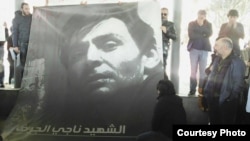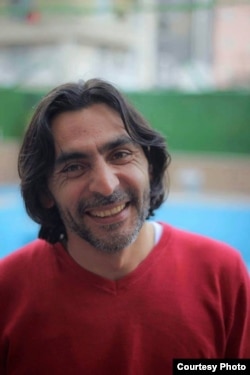Naji Jerf was a Syrian filmmaker who dared to make an anti-Islamic State documentary.
He paid for that work with his life, say friends and colleagues who mourned his death Monday.
"Being anti-IS put him at a great risk, but he didn't care because he believed in what he was doing," a friend told VOA in a social media exchange. He asked for anonymity because he fears retribution from IS.
Jerf was gunned down Sunday afternoon on a crowded street in the southern Turkish city of Gaziantep, days before he was to head to France where he was seeking political asylum.
While IS militants have not officially claimed responsibility for the attack, pro-IS users on Facebook and Twitter celebrated his murder. Jerf was on IS's death list, Syrian activists say.
Jerf had recently released an anti-IS film titled Daesh in Aleppo, using the Arabic acronym for the terror group.
It was aired by the pan-Arab al-Arabiya TV. Jerf documented testimonies from journalists and civil society activists who had been abused by the IS in the Syrian city of Aleppo from 2013-2014.
'Siding with justice'
"He was always siding with justice and he never betrayed his people," the close friend of Jerf told VOA.
Jerf was a member of "Raqqa is Being Slaughtered Silently," an underground anti-IS citizen journalists group that reports on abuses committed by Islamic State militants in the city of Raqqa and elsewhere in Syria.
Another member of the same group was beheaded in his Turkey apartment last October. IS said it was behind that killing.
Jerf, 38, was a native of Salamiyah, a town in the province of Hama. The father of two, Jerf was of Ismaeli background, a branch of Shi'ite Islam.
He was also the editor-in-chief of Hentah, a Syrian magazine that was critical of both the Syrian regime and IS.
Preparing to leave
Jerf was a week away from settling in France, his friends reported.
"He was finalizing his paperwork to settle there," on political asylum, said Ahmed Kaddour, a fellow journalist who has known Jerf since 2013.
"The first time we met was in Syria, then we met again in Gaziantep. He was a very humble man," he told VOA.
Jerf had been threatened several times in the past few months. According to close friends, an explosive device was attached to his car in Gaziantep two months ago, but Turkish police were able to remove it before it exploded.
"We all told him to leave Turkey a long time ago," journalist Manhal Barish told Alaan radio station. He said he was preparing to travel with Jerf.
"We were supposed to meet today [on Monday] to travel to Istanbul in order to finish our paperwork and go to France," Barish said.
Journalists and activists hope to create an award in his honor for "creativity and freedom of press.”
Killing condemned
The New York-based Committee to Protect Journalists condemned the killing and called on "Turkish authorities to bring the killers of Naji Jerf to justice swiftly."
Turkish police say the investigation into the murder is ongoing.
Meanwhile, tributes to Jerf are flowing on social media.
"Naji, I never met you in my life and I was very saddened [by your death]. What would have happened had I known you in person?" wrote Maksim Issa, a Syrian journalist on a Facebook page mourning Jerf.
"Naji's blood united Syria because he had a clear vision, project and a dream. He was a Syrian dream who got killed by scoundrels," said another Facebook post.





